
Dead Sea, Jordan: The situation in Syria will remain bleak and hundreds of thousands of young people will grow up increasingly desperate and radicalised if a political solution between local parties is not reached.
The deeply depressing albeit realistic conclusion emerged from the session on Syria at the World Economic Forum on the Middle East in the Dead Sea, when all the speakers agreed that others’ external forces should back off and but without agreeing that their own support should stop.
Russia placed responsibility for the desperate state of the Arab world on the US, as Washington’s lack of strategy in the region was bitterly attacked by Vassily Nebenzya, Russian Deputy Foreign Minister.
He attributed the mayhem in Iraq, Libya and Yemen as well as Syria to the absence of clear or consistent thinking from America and the West, as their leaders are guided by short term electoral cycles rather than the good of the region.
“The lack of vision has lead to contradictory actions, as the US helps the government of Iraq fight terror, yet is working with and arming radical groups in Syria,” said Nebenzya.
“You can’t flirt with terrorists. They may help in the short term, but in the end they will go their own way.”
The Russian minister stood firmly in favour of Bashar Al Assad’s record of fighting terror, and added that now the US has joined with the same groups to fight terrorists in Syria it has tacitly approved Al Assad’s actions.
Nebenzya’s vision was sharply attacked by Ayman Al Safadi, former Jordanian deputy prime minister, who mocked the Russian for refusing to attribute any responsibility for the civil war to repression by Al Assad’s regime.
“What started as a peaceful protest in 2011 was brutally repressed by Al Assad, and led to a war that if it continues will destroy Syria,” Al Safadi said.
“Russia and Iran have backed the regime with arms and money, and others including Turkey and Qatar have backed the opposition. The solution is beyond Syria,” he said.
Al Safadi refused to allow that Syrians face a stark choice between the regime or Daesh. “Syria does not have to chose between bad and worse,” he said.
The first step to an eventual solution will need all external powers like Russia, Iran and Turkey to stop feeding the war. Then some kind of interim arrangement will be needed with contributions from the three elements in the war of the regime, the secular moderates and the Islamists. As part of this Al Assad will have to go but the institutions of state should remain, in order to avoid the failures that we saw in Libya and Iraq, said Al Safadi.
A very modest shred of hope was contributed to the debate by Robert Mardini of the International Red Cross, who listed the terrible results of a war that had killed 200,000, created 10 million refugees both in and out of Syria and caused tens of thousands to go missing in prison or killed. Medical support is systematically prevented by all participants who refuse to let medical teams through and allow the wounded to suffer,
Mardini’s small element of hope came from the fact that despite this chaos the Red Cross and Red Crescent is talking to all the groups, which he extrapolated to show that all sides can talk when required, although that would need the right political environment. He did not foresee this happening the near future.












